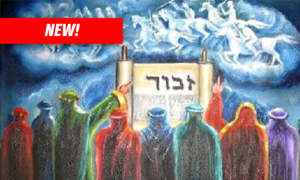Sicha, Shabbos Parshas Beshalach, 10 Shevat 5737
A. Was the Torah Given Only to the Elites?
After thirty days in the wilderness, the Jews’ food ran out. They complained, and G-d said, “Behold! I am going to rain down for you bread from heaven … so that I can test them, whether or not they will follow My teaching.” (Source 1).
Rashi explains that the test was whether they would observe the commandments related to the manna. However, the Midrash and Ba’al HaTurim explain that G-d is essentially saying that He will provide the Jews with the best possible conditions—bread from heaven with no worries—to test if, under such circumstances, they will learn and uphold the Torah (Source 2).
The Midrash learns that “the Torah was only given to the eaters of the manna.” In other words, the ideal state for Torah study is when people have no worries because their food comes directly from heaven.
The Rebbe raises a question: The Midrash’s statement that the Torah was given only to “the eaters of the manna” contradicts the fact that the mitzvah of Torah study obligates every person, in every situation—whether poor, wealthy, elderly, or healthy—to learn Torah.
The difficulty intensifies:
The Talmud states that Hillel, who studied Torah under extreme poverty, proved that one can study Torah even in dire circumstances (Source 3).
Even during the Temple period, Jews engaged in physical labor to the extent that Rabbi Shimon ben Yochai exclaimed: “What will become of the Torah?” (Source 4).
B. Whose Torah?
The Rebbe explains: The Talmud says that at the beginning of one’s study, the Torah is called G-d’s, but eventually, it becomes the learner’s—“and in his Torah he toils” (Psalms 1:2).
At first, when one studies superficially, the Torah is referred to as G-d’s Torah. However, when a person delves deeply and is fully immersed in their learning, the Torah is considered their own.
Based on this, when the Midrash says, “the Torah was only given to the eaters of the manna,” it means that people in a mental state similar to “the eaters of the manna”—free from worries and studying with complete focus—are the ones who can study Torah in such depth that it becomes “their own Torah.”
Nonetheless, ordinary Torah study is relevant and accessible to everyone, regardless of their circumstances.
C. How Is This Relevant to Us?
How can one achieve this state when, according to the Torah, a person must be involved in providing for their family?
A person must train themselves to be in a mental state similar to that of “the eaters of the manna” while studying Torah—free from financial worries—so that during the time of study, they are not distracted by any concerns.





